A drastic proposal: No more remakes
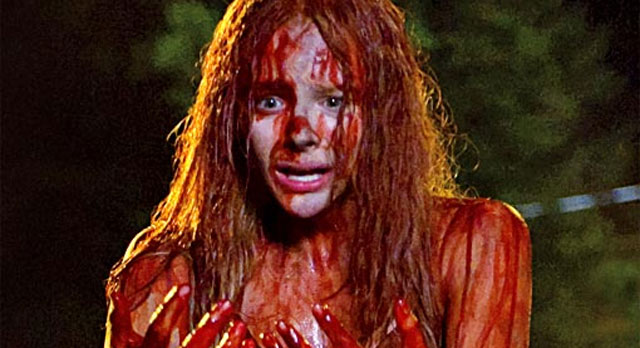
We need to ban remakes for a while, to bring some originality back into our cinemas.
As Halloween approaches, so do more pointless remakes of classic horror films. This week we’ve been treated to teasers for the new versions of Evil Dead and Carrie. It would be easy to be cynical about both projects, but who knows, maybe they’ll be better than the originals.
Except obviously they won’t be. Because the originals are just about perfect, and more importantly, they’re original. The clue is in the name. These glossy new remakes may smooth over the rough edges, but in doing so they eliminate everything that made these films interesting in the first place.
Talking of rough edges, it’s worth noting that director Fede Alvarez has made Evil Dead‘s raped-by-a-tree scene “way more terrible than the original.” But Sam Raimi, who made the original and also co-wrote and produced the remake, has expressed regret for putting that scene in his 1981 classic. So what happened? I can only assume that all those Spider-Man films warped his brain.
At least there’s no CGI in the new Evil Dead, which cannot be said for the remake of Carrie if that trailer is anything to go by. I love Chloë Moretz and Julianne Moore as much as the next 30 Rock fan, but they’re not Sissy Spacek and Piper Laurie.
The movie has the blessing of Brian De Palma who directed the original, and obviously the new Evil Dead has Sam Raimi on board, but should it be them who gets to decide? In the brilliant South Park episode “Free Hat”, George Lucas and Steven Spielberg change Raiders of the Lost Ark, mainly by putting Ewoks in it. George Lucas claims that he has the right to do what he wants with his movies, and Stan argues: “They’re not your movies; they’re ours.” Kyle adds: “When an artist creates, whatever they create belongs to society.” Whether that’s the case is debatable, but it’s certainly worth considering. For horror fans, Carrie is our Raiders and The Evil Dead trilogy is our Star Wars trilogy. And if there’s one thing we learnt from the Star Wars prequels, it’s that we should leave stuff alone.
So here’s a drastic proposal: No more remakes. It would only be a temporary ban, just to redress the balance and bring originality, creativity and imagination back into our cinemas. Eventually we could have one or two remakes again, but they’d have to be approved by a panel that consists entirely of me. Fine, we’ll work out the details later.
The interesting thing is that films are the only form of art in which works are remade. Oh and music, considering covers of songs are essentially remakes. But you wouldn’t read The Lord of the Rings and think: “Well it was alright, but I reckon I could have a better crack at it.” So why do people do that with movies? There’s no argument against remaking other forms of art that won’t apply to films.
When justifying remakes, filmmakers tend to use two main arguments. The first is that we now have technology to make films look better than they did the first time round. What they mean by that is: “We now have computers.” So this year’s Total Recall remake probably looked very shiny and cool, but we’ll never know because no one saw it. But Paul Verhoeven’s Total Recall looked great in the first place; the physical effects are still highly impressive. Of course some of it looks silly (and that’s mainly Arnie’s fault), but that’s because it was made in the past. That’s what we need to remember: Some films were made in the past. All art is a product of its time and that’s part of what’s interesting about it. You wouldn’t remake a cave painting because we now have more sophisticated materials. They’re valuable precisely because of their space in time. Remaking films to all look the same totally rids them of any of that history and context.
The other argument used to justify remakes is that we’re bringing these great films to a whole new generation. But why can’t this new generation watch the originals? The new generation have Netflix and stuff. Nowadays, when I ask someone if they’ve seen, say, A Nightmare on Elm Street and they say they have, I have to clarify if they mean the Wes Craven masterpiece or the Michael Bay waste of everyone’s time. When they say that they mean the remake I want to grab them and say: “Then you lied, you haven’t seen A Nightmare on Elm Street.” But it’s not their fault; like so many things in this world, it’s Michael Bay’s fault. He’s responsible for a range of soulless remakes of horror classics, none of which I’ve seen, because I don’t need to see them; I’ve seen the originals and I know what a modern horror film looks like. I can put two and two together and avoid giving Michael Bay any money.
Of course that’s the real reason to remake a successful movie; it will make money. To use the critic Kim Newman’s analogy: “Opening another McDonalds is a safer bet than a standalone restaurant.” There’s something insulting, then, about the pretence that remaking a movie is some sort of noble tribute; filmmakers always claim that the reason they’re remaking a classic is because of how much they loved the original. But surely loving something is a reason to leave it alone. If you love it so much, why change it? Remaking a film implies that the original is somehow defective.
If you really love a film then be inspired by it, or even reference it. This year we’ve seen some fantastic works of modern horror such as The Cabin in the Woods and ParaNorman, both of which lovingly pay genuine tribute to classic horror films, while also telling original stories. The great thing about Kyle’s idea that art belongs to society is that we can reach into the pool of our collective culture and take out bits we want to use, just as long as we put something else back in. Whether something’s plagiarism or not is pretty much down to the quality of the resulting piece of work; if it’s good then it’s an homage, if it’s bad then it’s stealing. This very article is a derivative mess.
So by all means draw inspiration from the enormous wealth of art that makes up our culture, just stop remaking it all. There are planned remakes of everything from American Psycho to The Orphanage; An American Werewolf in London to Videodrome (written by Ehren Transformers Kruger, which I’ve complained about here), and we need to introduce this ban before it’s too late. There have only been about two worthwhile remakes; The Fly and The Thing. Don’t get me wrong, they are two of my favourite films; it just seems that two decent remakes in the entire history of cinema doesn’t quite justify the endless slew of boring, shiny, production line rehashes. Maybe banning remakes would stop us from seeing some of the greatest works of cinema ever made, but you know what? That’s a risk I’m willing to take.
 CliqueClack
CliqueClack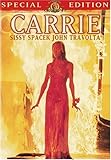
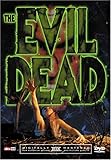


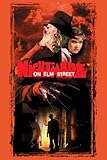
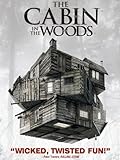

I think I could get on board with a remake if we imposed some limits. Has to have been 30 years from the last sequel in the series, regardless of how successful it was. Either that or something like “everyone (and we mean EVERYONE) involved with the original is dead”. The 30 year rule would mean that yeah, it’s about time for the Evil Dead remake and the Carrie remake is past due, unless we allow for sequels of both films. The later rule however would probably mean that by the time a remake would be allowed, no one would care, so remakes wouldn’t be made.
And do we include reboots in this? If you don’t, everyone will just call everything a reboot instead of a remake. Did we need the Spider-Man reboot? Probably not, but what about Nolan’s Batman movies? I’m certainly glad those happened.
And it’s not like the originals no longer exist. You can still watch them. I think that’s where your argument has a bit of a problem in comparing it to the South Park episode’s statments. In these cases no one is doing anything to the originals. I don’t see it as the same thing as changing the originals like in your South Park example. Now, if when the Evil Dead remake comes out next year, Sam Raimi personally went around and destroyed every copy of the original movie, then yes, we would have a right to complain. But that movie is still going to exist. And in the year 2013, a large general audience isn’t going to go see Evil Dead 4 because too many people are ignorant to the original and won’t want to put forth the effort to “see the first three” before seeing the fourth one. However, you just simply title it Evil Dead and those same uninformed people won’t even know it’s a remake. I guess at the end of this, my thoughts are let the remakes flow and I still think they’ll either be great or sink on their own merits, regardless of their tie to a previous film.
I don’t know that I agree. First, I’m not a big horror film fan, so I’m speaking from a more generic perspective. But someone recently at i09 (https://io9.com/5931046/why-remakes-are-one-of-our-greatest-achievements-as-a-civilization) compared movie remakes/book adaptations to folk tales, an analogy that I’m a big fan of.
Example: I reviewed the Footloose remake last year. I had friends who said they’d never see it, because it was a needless remake. But they missed out on a hilarious performance by Miles Teller, proof that Julianne Hough can do more than just sing and dance and the potential of a star being born in Kenny Wormald. I enjoyed the hell out of the flick, and the BluRay sits right next to the BluRay of the original on my shelf.
I guess I’m just more tolerant of remakes than others. If someone else comes along in 10 years and wants to remake Star Wars, I don’t think I’d be against it. That might be sacrilegious to say around my group of friends, but I’d welcome it.
Like John Waters once said, just remake the bad movies and make them better.
But you really hit the nail on the head when you said people who weren’t born when the original was out won’t be bothered to see it … because it’s old. Remakes are for that generation. Older folks like myself generally hate remakes of great films that we grew up with, with only a few that can stand up with the original. I’d like to see someone remake Plan 9 from Outer Space, but with a really good script, cast and special effects rather than a remake of King Kong, The Wizard of Oz, Citizen Kane, or even Rosemary’s Baby. Remakes of classics like The Haunting, Psycho and The Omen truly do fall into that “needless” category, and I worry that someone seeing an awful remake will assume the original is just as bad and miss out on something wonderful. So, I don’t think all remakes should be banned, but they should be better thought out and anything on the AFI list should be off limits!
When I was in graduate school and Disney started the Chronicles of Narnia films, I held a renaissance party for graduate students kids and tried to show them the 1980s Lion, the Witch and the Wardrobe version. Bad costumes aside, I viewed it as a better adaptation. Needless to say, the kids were not having it and I eventually put the Disney version in.
I agree with you regarding needing more original films. However, while books might not do remakes, they do do sequels or texts “inspired” by originals. How many fantasy series basically rehash LOTR (Terry Brooks, etc.)? And, don’t get me started on the number of regency “Pride and Prejudice” continuation novels (Darcy’s Daughters, The 2nd Mrs. Darcy, etc.) So, novels do it, too, but they just can’t get away with blatant plagiarism.
Regarding Evil Dead, @ Philly Comic Con, Bruce Campbell seemed pretty excited for the Ash reboot. He didn’t see it as a straight up remake, but gave it his seal of approval and talked about reviewing the dailies.
I’m pretty much on board with the horror aspect of film remakes (to this day, I refuse to see the rehashing of Dawn Of The Dead), but I will counter with several I find equal to the originals: Frankenstein (remake of the Edison Frankenstein from 1910), Dracula (Nosferatu) and Charles Laughton’s The Hunchback Of Notre Dame (from Lon Chaney Sr.’s original). There’s a glaring difference, however: I’m talkin’ a completely different era of film making. But … it still proves the point: Older is better in all those cases.
I haven’t seen enough of the other genres to satisfyingly vent an opinion. (Though … Charlie And The Chocolate Factory rather fuels that fire.) While a different sort of remake, I dog-dug The Magnificent Seven (The Seven Samurai), but still we’re talking a different era without all the new-fangled effects and aspect ratios and glitter and glitz.
While I appreciate Ivey’s position above – he makes some good points – I have yet to plunk down to see the doppleganger of Footloose.